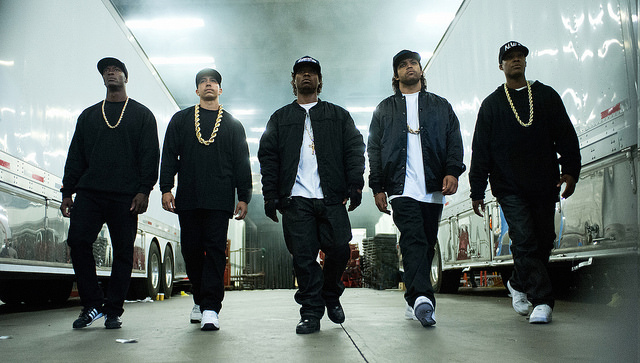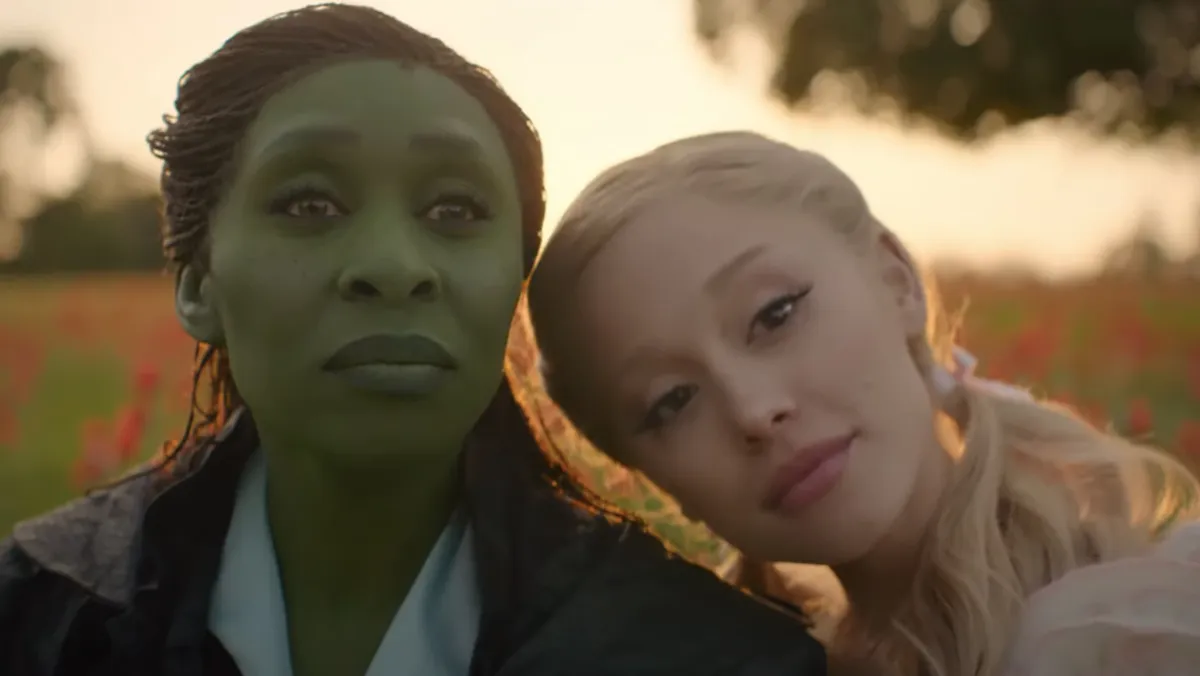And the Straight Outta Compton train just keeps on going. According to a story in the L.A. Times, Compton screenwriter, Jonathan Herman, did include a scene depicting Dr. Dre beating Dee Barnes in his original draft of the film. (Trigger Warning: The scene is described very briefly, so if you’re not comfortable reading depictions of violence, skip the next paragraph)
The L.A. Times reports:
In the scene, the fictional Dre, “eyes glazed, drunk, with an edge of nastiness, contempt” (per noted from the script) spots Barnes at the party and approaches her.
“Saw that [expletive] you did with Cube. Really had you under his spell, huh? Ate up everything he said. Let him diss us. Sell us out.”
“I just let him tell his story,” Barnes’ character retorts, “That’s what I do. It’s my job.”
“I thought we were cool, you and me,” Dre fires back. “But you don’t give a [expletive]. You just wanna laugh at N.W.A, make us all look like fools.”
The conversation escalates, Barnes throws her drink in Dre’s face before he attacks her “flinging her around like a rag-doll, while she screams, cries, begs for him to stop.”
So, it was in there, and then was cut completely.
Upon being asked by a female interviewer, Allison P. Davis, of New York Magazine, about the use of “Bye, Felicia” in Compton, F. Gary Gray gave one of the most defensive, dismissive, and insulting answers he could have given. First, Davis writes what the scene entails:
A young Dr. Dre is in his room while a party rages in the crew’s hotel suite. Suddenly, two armed men start pounding on the door — one of them is looking for his girl, Felicia. Dre slams the door, walks into the next room looking for Felicia, whom he finds fellating Eazy-E. Ice Cube, Dre, and Eazy-E grab some guns, reopen the door to confront the two intruders, and inform them that Felicia was too busy sucking someone else’s dick to come to the door. After the two intruders run down the hall, Eazy-E grabs Felicia — who is wearing nothing but a hot-pink thong — and pushes her out into the hotel corridor by the head. As the door slams, Ice Cube deploys the very first “Bye, Felicia.”
It’s a completely fictitious moment, and so was not the actual origin of “Bye, Felicia.” According to Gray, it was an improvised, impromptu “joke” that the young actor playing Cube came up with on set that he thought was “brilliant” and wanted to use. It’s troubling enough that the joke a young actor comes up with involves such casual misogyny. It’s even more troubling that the grown man directing him thought it was hilarious and didn’t stop to think – Hey, I’m putting this in a film that lots of people are going to see. Since this is a made-up moment, and has nothing to do with what actually happened to the people I’m writing about…what am I actually trying to say with this? You may say that this is “overthinking,” but that’s a director’s job. It’s a director’s job to think that hard about what goes into a film, even if audiences don’t.
In any case, Gray then goes on to get upset at Davis for even asking the question:
I asked Gray how, as a director, he was able to reconcile the fun pop-culture reference with a moment of degradation. “I wouldn’t try to reconcile it at all,” he said. “If you’re looking to be politically correct in entertainment, especially as it relates to comedy, that’s the end of entertainment. If people want us to make entertainment in a certain way, you tell me how we should have shot the scene.”
I said I didn’t know and he went on, “That’s just an awful question. You know. It’s like, if Oprah says it’s a powerful movie, and we know how she feels about how women are depicted in film and entertainment and things like that — I feel like you’re digging. We should be focusing on how the police are treating innocent American citizens. What about that? Let’s talk about something as important, if not more important, if you really want to go there.”
*record scratch* Wait, what? We’re talking about a specific moment in your film, and you 1) Give the excuse, “Well, Oprah liked it so….” 2) Call a woman worrying about how women are portrayed in media “political correctness” and 3) derail the conversation by bringing up police brutality? I’m sorry, no. No, no, no. That’s internet troll behavior. That is not what I would expect from a working director in Hollywood. And yet. Talking about a scene in your film is not “digging,” it’s analyzing the work you put out there. If you don’t think your film is up to withstanding scrutiny, why are you making films at all?
Oh, and BTW – F. Gary Gray was the original camera man on Dee Barnes’ TV show, Pump It Up, and Barnes accuses him of helping to blackball her from the entertainment industry. Make of that what you will.
It’s not like this is unexpected or even new. Remember when I said that we all like problematic stuff? Well, pretty much every artist we’ve ever liked have skeletons in their closets. The size and shape of those skeletons vary, but they’re there. And men in particular often get a free pass when they’re physically abusive, or abusive in any other way, because they’re so goshdarned talented! Meanwhile, Sinead O’Connor tears a picture of the Pope on television, and we barely hear from her again. Courtney Love does heroin (with Kurt Cobain), and she’s often blamed for their woes and depicted as a harpy, whereas people are more likely to talk about how “troubled” Cobain was.
Talented men in music (in entertainment, in…the world) have a long history of having their sins and faults absolved by their industries and by the media because they’re good at writing a song, or creating whatever. Dr. Dre and Ice Cube aren’t the first people ever to conveniently leave things out of their stories so as not to tarnish their legacies, and they’re not the first celebrities that other people help to do so. John Lennon, David Bowie, Elvis – even moving on to modern musicians like freaking Chris Brown, who’s allowed to perform at the Grammys after beating up Rhianna. And since biopics of celebrities rely on rights to things like music from the estate, those rights won’t be acquired unless the celebrities or their families sign off on them. And they’re not going to sign off on “things that make them look bad” even if it’s the truth. So it may be that we’ll never have a completely honest biopic of a musician. They’re not designed for honesty – they’re designed for nostalgia.
This is why it’s so important to keep bringing these things up. Because the subjects of biopics never will, nor will the people making money off those people. It’s up to those of us watching to keep tabs and remember that achieving artistic greatness often comes at a hefty price, and we have to really think about whether that price is worth it. Whether good music – even great music – matters more than the women that were hurt to make it.
(Image via Automotive Rhythms on Flickr)
—Please make note of The Mary Sue’s general comment policy.—
Do you follow The Mary Sue on Twitter, Facebook, Tumblr, Pinterest, & Google +?









Published: Aug 20, 2015 02:12 pm